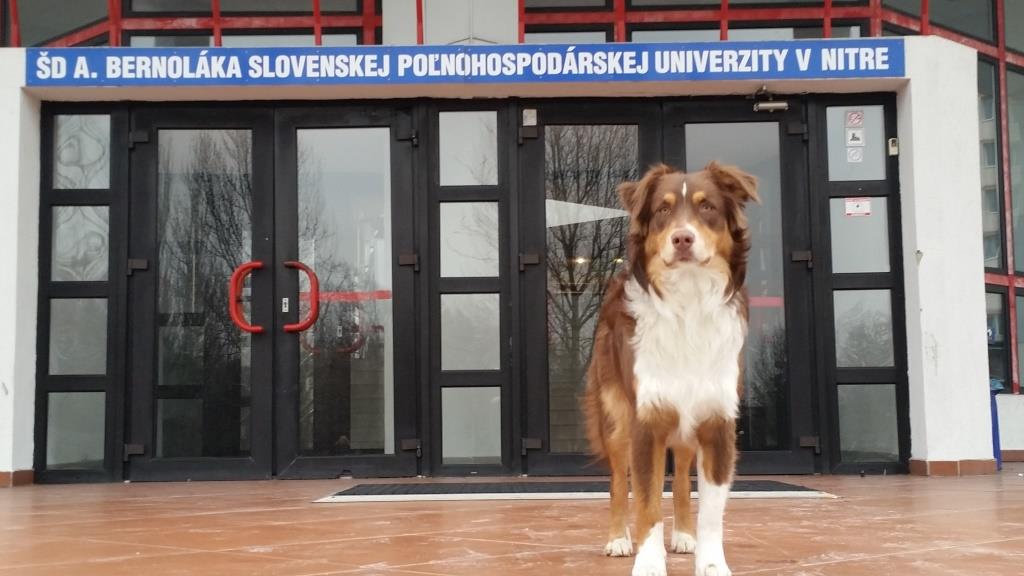This was the CASEE Summer School 2017
“Ethics, Quantity and Quality Assurance in Agriculture, Food Production and Food Technology”
From 3 July until 12 July 2017 the Faculty of Agriculture at the University of Novi Sad hosted this year's CASEE summer school and prepared the stage for stimulating discussions, interactive workshops, lectures and field trips.
The Summer School was organized within the framework and with the partner institutions of the Joint Master's Degree Programme in Sustainability in Agriculture, Food Production and Food Technology in the Danube Region.
The main focus of the course was on self-development in a multicultural European region through interactive exercises and discussion. The Summer School included courses on quantity and quality assurance in traditional and organic agriculture and food production and food technologies. Courses related to intercultural and ethical aspects of food production and consumption, societal challenges related to GMO, role of media in food and health perception, ethical challenges of recreational fishing and many more gave an overview and created fruitful discussions on the overaching topic of ethics in agriculture, food production and food technology.
In total, there were 15 lectures, three workshops, three presentations related to international projects covering topics of the summer school, three field trips and an excursion to the capital of Serbia, Belgrade.
Field trips to traditional and organic farms provided further insights in regard to advantages and disadvantages of both approaches and widened the students' understanding of practical problems in the field of ethics, quantity and quality assurance in agriculture and food production. Besides having earned 4 ECTS this approach also helps students in finding solutions and reveals opportunities in their academic and future professional life.
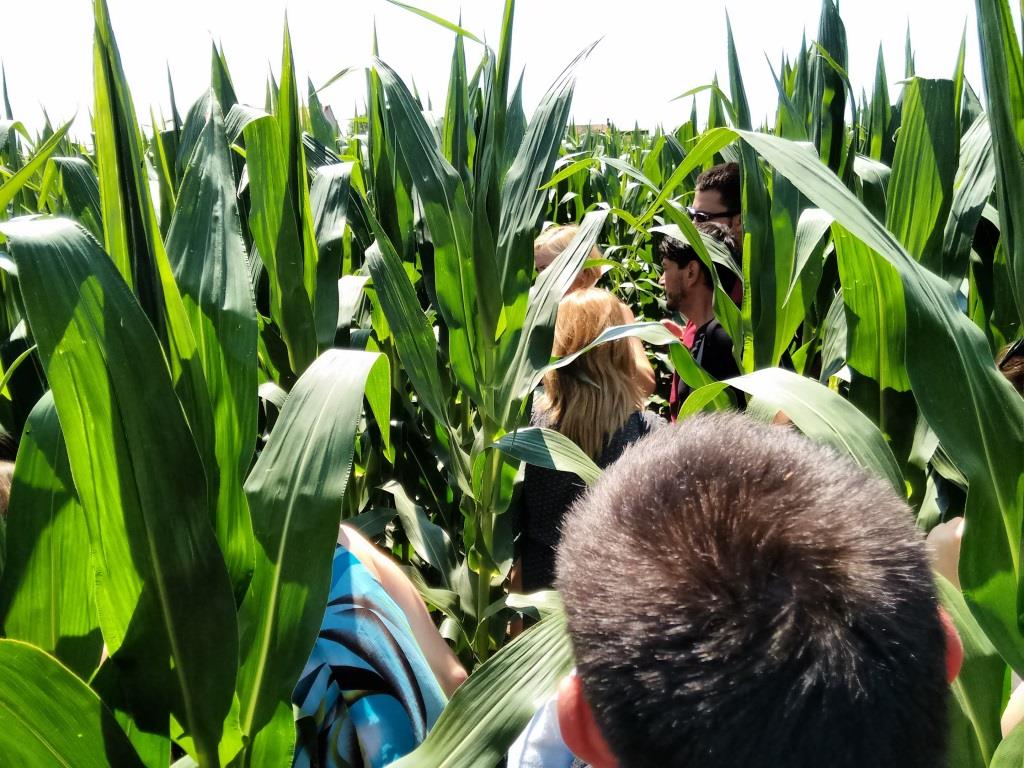
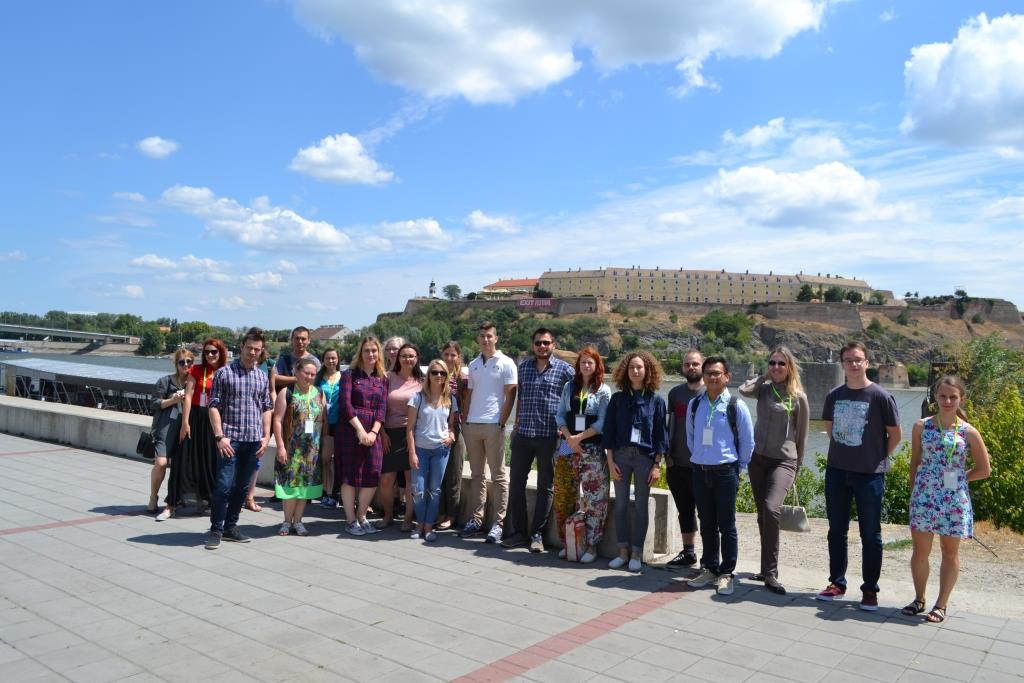
Field trip to Agrocentrum
Besides an intercultural student group also the lecturers came from different partner universities all around Europe as well as a guest professor from Siberia.
Also the UNS Rectorate provided a warm welcome for all students and lecturers:
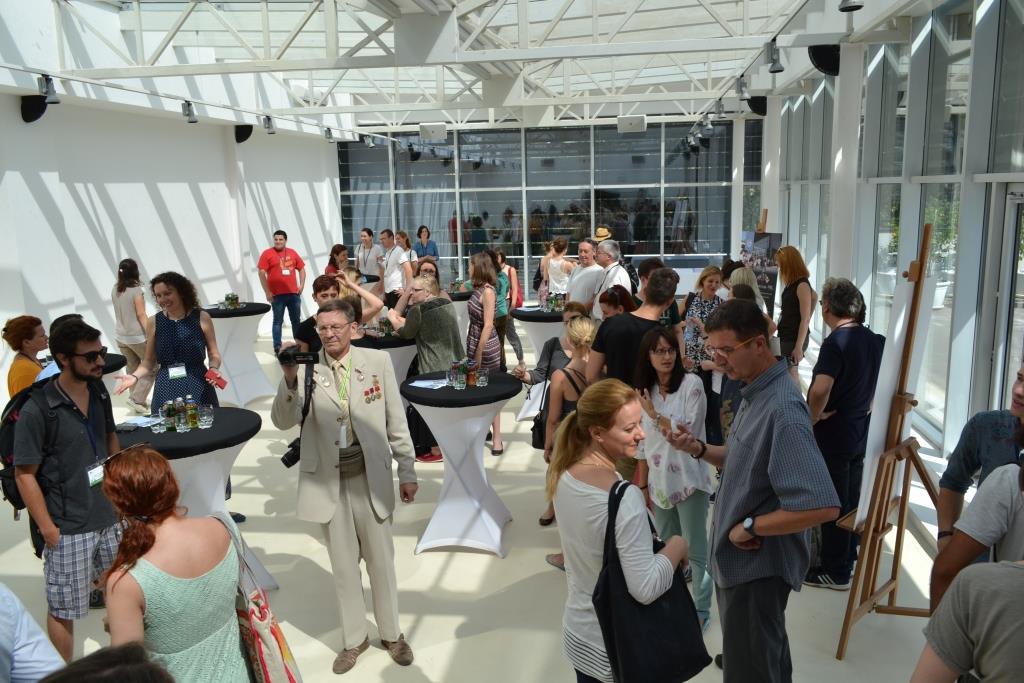
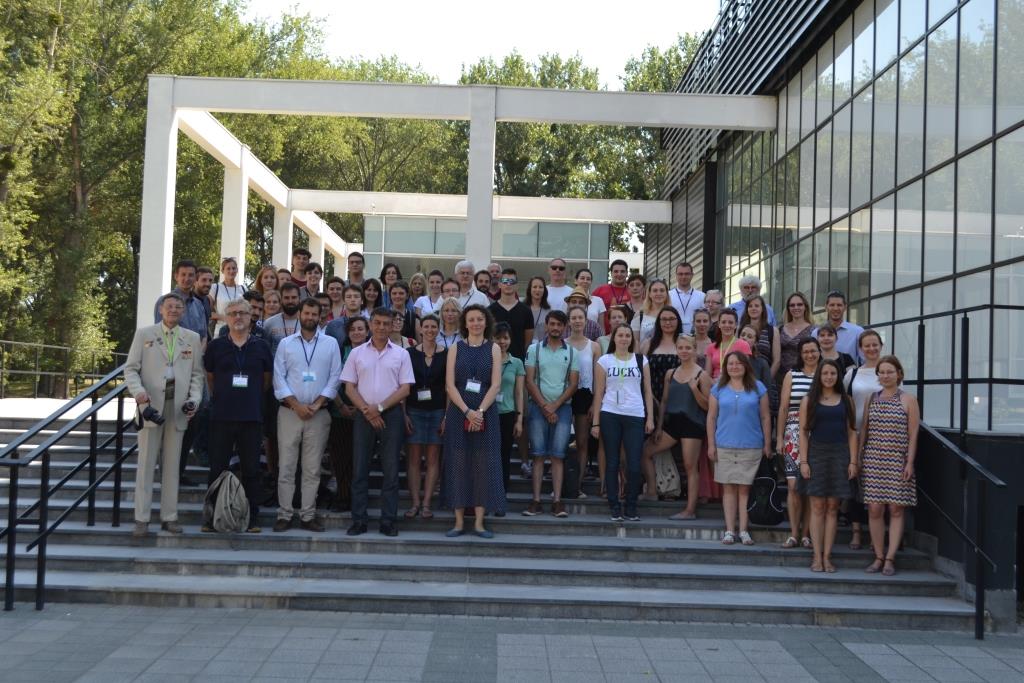
The student videos of the participants give a very good overview of the experiences at this year's summer school.
Enjoy the video contributions:
Thank you to the UNS colleagues and the student directors!
Partners
The International Summer School is led by university lecturers from different countries. Several phases of group work, short presentations, discussion, and problem solving sessions give a well-rounded learning experience.
- University of Zagreb Faculty of Agriculture, Zagreb, Croatia
- University of Natural Resources and Life Sciences, Vienna (BOKU), Austria
- Czech University of Life Sciences, Prague, Prague, Czech Republic
- Szent Istvan University, Gödöllő, Hungary
- University of Novi Sad, Novi Sad, Serbia
- USAMVBT - Banat University Agricultural Sciences and Veterinary Medicine Timişoara, Timişoara, Romania
- Kemerovo State Agricultural Institute, Russia
- Warsaw University of Life Sciences, Poland
Programme
Please, find more information including the programme at the Summer School website of the hosts at UNS.
Information about past summer and winter schools can be accessed in the Summer School Archive.
This was the CASEE Summer School 2016
The CASEE summer school 2016 on the topic of
"Management of agriculture and food in the Danube region interdisciplinary, transdisciplinary and intercultural approach"
was held at the Czech University of Life Sciences Prague, Czech Republic, from 10th until 22nd of July 2016.
The Czech University of Life Sciences in ooperationc with CASEE partner universities (UNIZG, WULS, BUASVMT, SZIU, BOKU) organized the International Summer School entitled "Management of agriculture and food in Danube region interdiciplinary, transdisciplinary and intercultural approach". Altogether 15 students and 13 lecturers with a multicultural background participated in the summer school. Their attendance was supported by CEEPUS grants and the host CULS. The school contributed to the mission of the international Joint Degree Master Programme Danube AgriFood Master and included a student case study competition.
Besides lectures and a social programme including the visit of the CULS brewery and of the historical UNESCO town Kutná Hora, the summer school offered one specialty: The students (2 from University Novi Sad, 3 from BOKU, 4 from University in Zagreb and 6 from WULS) were given the opportunity to demonstrate their theoretical knowledge in a practical case. They worked together with a young farmer, cultivating about 8 ha of land, who needed advice on concrete ideas how to develop his farming activities, because he wanted to strike a new path different from mainstream agricultural activities in the region. A local Action Group Podlipansko informed about the activities of the students under the title: International students attempted to find alternative ways of farming in the territory of Podlipansko. The farmer highly appreciated their suggestions and is willing to implement some of them. On the final day of the summer school the students presented their experiences with food in the Czech Republic and in an international context.
Further information:
This was the CASEE Winter School 2016
The CASEE winter school 2016 on the topic of
"Biotechnology and Food Sciences"
was held at the Slovak University of Agriculture, Nitra, Slovakia, Faculty of biotechnology and food sciences from 15th until 29th of February 2016.
The Slovak University of Agriculture in cooperation with CASEE partner universities organized the International Winter School entitled "Biotechnology and Food Sciences" which was held from 15 to 29 February 2016, in Nitra. The winter school activities were part of the International Joint Degree Programme - Danube AgriFood Master.
The target group for attending the winter school were final year undergraduate students and graduate and postgraduate students from life science disciplines. The main aim of the winter school was to improve the mobility of students and multilateral cooperation between higher education institutions in the Danube region on the development of agriculture, food production and technology and sustainable development with an emphasis on biotechnology.
The winter school attended 15 students from Austria, Greece, Croatia, Italy, Germany, Hungary, Macedonia, Poland, Philippines, Serbia and Thailand. Besides this intercultural student group almost two dozen lecturers from the different partner universities and associated partners taught in Nitra. Upon successful completion of the winter school participants have earned 4 ECTS credits.
Overview
This International Winter School empowers students to take part in forming the sustainable agriculture and food technology of the future. They gain knowledge and grow their skill set with regard to the intercultural and social aspects, anthropic landscape and natural resources of sustainability in agriculture and the food industry in the Danube region. Understanding the intercultural and regional aspects of sustainable agriculture and food technology is crucial in finding viable pathways to long-term success in Central and Eastern European agriculture.
The main focus of the programme will be on self-development in a multicultural European region and also get the students from various countries and continents to interconnect. At the end of the winter school, students should be able to identify some of their own culturally-biased assumptions and behaviour, and begin to objectively address the benefits of multiculturalism for regional agriculture and food industry.
Course Content and Aims
Intercultural aspects, sustainable development, climate change and protection, food security, technology and quality, sustainable food production, biotechnology and sustainable energy make up the core content of the winter school programme. The general aims of the course are:
- to develop a good understanding of biotechnology and food sciences with a special emphasis on the Danube region, and
- to improve student mobility and multilateral cooperation between higher education institutions in the area of agriculture, resource management, food production and technology and sustainable development
Partners
The International Summer School is led by university lecturers from different countries. Several phases of group work, short presentations, discussion, and problem solving sessions give a well-rounded learning experience.
- The Slovak Agricultural University in Nitra, Nitra, Slovakia
- University of Zagreb Faculty of Agriculture, Zagreb, Croatia
- University of Natural Resources and Life Sciences, Vienna (BOKU), Austria
- Czech University of Life Sciences, Prague, Prague, Czech Republic
- Szent Istvan University, Gödöllő, Hungary
- University of Novi Sad, Novi Sad, Serbia
- USAMVBT - Banat University Agricultural Sciences and Veterinary Medicine Timişoara, Timişoara, Romania
- Warsaw University of Life Sciences, Poland
Programme
- Introduction and Guidelines
- Slovakian Gastronomy
- Food marketing
- Visiting University campus and Faculty of biotechnolgy and food sciences laboratory
- Using of pumpkin cake in broiler nutrition
- Quality of fish and shellfish products
- New biopolymer based microcapsules for plant protection/nutrition agents controlled release
- Microbial diversity of traditional food from the Danube region - alternative solutions to ensure food quality and safety
- Anthropogenic impact on the landscape
- Field trip
- Food quality
- Food and its cultural context
- Natural food additives
- Food packaging and environment
- On selecting the best food supplier, GIS+AHP supported evaluation of land suitability for irrigation
- Decision making tools for assessing food chains
- Bacterial contamination of food, microorganisms in biotechnology
- Presentation of the Danube AgriFood Master curriculum
- Mycotoxins and their producers in food
- Microbiological quality of wine
- Antibiotic resistance of bacteria isolated from food
- Cultural programme
Field Trip
As a part of the winter school following field trips will be organised:
- field trip to agricultural production site
- tour to the old town of Nitra
Website
http://www.fbp.uniag.sk/en/news-and-events/items/international-winter-school-2123/
This was the Summer School 2014
“AGRIFOOD – THE HEARTBEAT OF RURAL AREAS”
University of Zagreb Faculty of Agriculture, Zagreb, Croatia from 1st until 8th of September 2014
Overview
Understanding the intercultural and regional aspects of sustainable agriculture and food technology is crucial in finding viable pathways to long-term success in Central and Eastern European agriculture. This International Summer School will give students the opportunity to improve their knowledge and grow their skill set with regard to the intercultural and social aspects, anthropic landscape and natural resources of sustainability in agriculture and the food industry in the Danube region.
The main focus of the programme will be on self-development in a multicultural European region. At the end Summer School, students should be able to identify some of their own culturally-biased assumptions and behaviour, and begin to objectively address the benefits of EU multiculturalism for regional agriculture and food industry.
Course Content and Aims
Intercultural aspects, sustainable development, climate change and protection, food security, technology and quality, sustainable food production, biotechnology and sustainable energy make up the core content of the summer school programme. The general aims of this course are:
- to develop a good understanding of agriculture, food production and technology in the aspect of sustainability in the Danube region, and
- to improve student mobility and multilateral cooperation between higher education institutions in the area of agriculture, resource management, food production and technology and sustainable development
Partners
The International Summer School is led by university lecturers from different countries. Several phases of group work, short presentations, discussion, and problem solving sessions give a well-rounded learning experience.
- University of Zagreb Faculty of Agriculture, Zagreb, Croatia
- University of Natural Resources and Life Sciences, Vienna (BOKU), Austria
- Czech University of Life Sciences, Prague, Prague, Czech Republic
- Szent Istvan University, Gödöllő, Hungary
- Corvinus University of Budapest, Budapest, Hungary
- The Slovak Agricultural University in Nitra, Nitra, Slovakia
- University of Novi Sad, Novi Sad, Serbia
- USAMVBT - Banat University Agricultural Sciences and Veterinary Medicine Timişoara, Timişoara, Romania
Lectures & Programme
- Croatia: History & Culture at the Crossroads of Europe
- Food safety & food quality & healthy diet
- Adaptation and development of rural areas
- Croatian Eno-Gastronomy / “Iće & piće” Hrvatske
- Climate change & agriculture
- Sustainable soil & water management under climate change
- Use & conservation of environmental resources in agriculture
- Waste management, energetic utilization of biomass
- The EU Agri-environmental scheme
- Risk management in agriculture
- Advanced decision making for sustainable agriculture
- Agriculture and cultivated landscapes
- Less favoured areas and areas with environmental restrictions
- Mycotoxins and their producers in food
- Assessment of beneficial and toxic effects of natural substances on ovarian functions
- Agrobiotecnology of plant production
- Programme for Download
Round Table Themes and End Presentations of the Summer School 2014
- Renewable energy, pro & contra
- Preservation of rural landscapes and environment
- Microbial contamination of animal origin foodstuffs
Field Trip
As a part of summer school following field trips will be organised:
- field trip to State-owned hunting ground, Prolom, Buzeta (experimental station established to perform internship and teaching in hunting, beekeeping, phytocenology, botany, soil science, etc.) and preparation of national wild game dishes will be organized on Wednesday, September 3
- field trip to Istria peninsula will be organized from Friday, September 5 to Saturday, September 6
Website
http://www.agr.unizg.hr/en/category/events/17
This was the CASEE Summer School 2013
The CASEE summer school 2013 on the topic of
"Intercultural training with focus on sustainable agriculture, food production and food protection in the Danube Region"
took place in the end of September 2013 at the Banat’s University of Agricultural Sciences and Veterinary Medicine „King Michael I of Romania” - USAMVBT in Timisoara, Romania.
The aim was to transfer the understanding of the importance of intercultural and regional aspects of sustainable agriculture in finding viable pathways to long-term success in Central and Eastern European agriculture. This summer school gave the students the possibility to improve their knowledge and grow their skill-set regarding the intercultural and social aspects, anthropic landscape and natural resources - related to sustainability in agriculture and the food industry in the Danube region.
The main focus of the course was on self-development in a multicultural European region through interactive exercises and discussion. At the end of this course, students werwe able to identify some of their own culturally-biased assumptions and behavior, and begin to objectively address the benefits of EU multiculturalism for regional agriculture and food industry.
The courses combined theoretical aspects and field trips in order to broaden horizons and provide life changing experiences in the context of global changes, ecosystem degradation, biodiversity conservation and the technological and economic ability to adapt. The Banat region -- inherently intercultural and diverse -- served as the basis for the exploration of intercultural topics and their implications on agriculture and the food industry in the Danube region.
Courses
The Summer School "Intercultural Training with special emphasis on sustainability in agriculture, food production and food technology in the Danube region" provided an overview of social and cultural context of food and agriculture. The main focus was on intercultural learning, multicultural learning, but also basic studies of EU union. Selected courses e.g. included Sustainability of agriculture in the Danube region, organic farming and organic food, food microbiology. In addition, educational priorities in the area of agriculture and the environment in the Danube region will be discussed and each partner university will present its teaching and research activities. Last but not least, topic-related excursions (e.g. workshops on traditional food) in the Banat region completed the program.
The courses culminated in a final group project where students worked together in applying the ideas and practices from the school to real world challenges and develop feasible solutions. The goal was to expand students' realm of consideration to think outside of their own cultural biases.
Lectures
- Sustainability aspects of agriculture in Danube Region
- Social and Cultural context of food
- Gender and rural development
- Educational priorities in a agriculture and environment
- Intercultural learning
- Multicultural communication
- Basic studies of European Union
- Banat Interculturality
- Organic food quality and safety
- Food safety food adulteration and authentication, health safety aspects
- Organic farmin in Poland
- Plant Biotechnology
- The impact of dietary habits and traditional food on health population in the Danube Area: Intercultural Issues
- Animal biotechnology and embryotechnology
- Food microbiology
- Animal pathophysiology
- Traditional food in Banat
- Cultural evolution of the central European built sites – the case of Banat region
- Diversity of Architectural styles
USAMBVT
The Banat’s University of Agricultural Sciences and Veterinary Medicine Banat from Timişoara (USAMVBT) is an institution specialized in agronomical and veterinary higher education, with a national and European span.
Its traditions are connected to the establishment of the Faculty of Agronomy in 1945, which functioned besides the Polytechnic Institute from Timişoara. In the socio-economical and political conditions of the time, King Mihai I of Romania promulgated the Law 617/1945 for the creation of the Faculty of Agronomy within the Polytechnics of Timişoara. After 1989, the University has had a continuous evolution, by the diversification of domains and specializations in the educational offer. At present, USAMVBT functions with 6 faculties (Agriculture, Horticulture and Forestry, Agricultural Management, Veterinary Medicine, Animal Science, and Biotechnologies, Food Processing Technology), with a number of 22 licentiate’s degree programmes, 22 programmes of master studies and 2 doctoral schools (www.usab-tm.ro).
Timisoara and the Banat
The Banat is a geographical and historical region in Central Europe currently divided between three countries: the eastern part lies in western Romania (the counties of Timiș, Caraș-Severin, Arad south of the Mureș, and Mehedinți), the western part in northeastern Serbia (the Serbian Banat, mostly included in Vojvodina, except for a small part included in Belgrade Region), and a small northern part in southeastern Hungary (Csongrád county). It is populated by Romanians, Serbs, Hungarians, Roma, Germans, Krashovani, Ukrainians, Slovaks, Bulgarians, Czechs, Croats and other ethnicities.
The Banat is a part of the Pannonian Basin bordered by the River Danube to the south, the River Tisa to the west, the River Mureș to the north, and the Southern Carpathian Mountains to the east. Its historical capital was Timișoara,now one of the largest Romanian cities, with a population of 303,708 inhabitants (the third most populous city in the country, as of 2011), and considered the informal capital city of the historical region of Banat, Timișoara is the main social, economic and cultural center in the western part of Romania.



